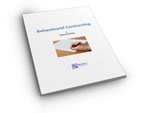 I recently received a question as a comment to an earlier post and, rather than keep it buried there, am posting both question and my reply as a separate post here.
I recently received a question as a comment to an earlier post and, rather than keep it buried there, am posting both question and my reply as a separate post here.
“I am interested to understand the extent to which CBT and cognitive behavioural coaching is relevant in the world of small business. My experience suggests that although most people in the western world seem to be getting increasingly busy – those who create and run their own businesses are working at the speed of light – if this is the case solutions focused and rapid results coaching approaches could be an excellent intervention.”
It is Cognitive Behavioural Coaching (CBC) that is used in business and not Cognitive Behavioural Therapy (CBT). CBT is a therapy and would only be used for people who required counselling.
Secondly, CBC works on thoughts, feelings and behaviours. When individuals want to be successful they need to develop the behaviours that will lead to success. It’s the thoughts that shape the way we feel and our feelings shape our behaviour. Many coaching approaches (whether they are aware if it or not) draw on Cognitive Behavioural Psychology to create the most appropriate mindset for success.
Here’s a case study
A Junior Partner in a well established firm of solicitors worked long hours but avoided meeting clients wherever possible. She had attended networking and client management courses and while she could quote the theory chapter and verse, she never managed to apply it. She was not bringing in new business and was failing to meet her targets in relation to her billable hours.
Her organisation being concerned about her lack of performance was considering whether she would be asked to leave but decided to offer her executive coaching. She soon realised that her problem was down to the lack of confidence she had in herself. Subsequently, her six, ninety minute confidence coaching sessions were used to identify her self-defeating thoughts replacing these with a more effective and self-enhancing way of thinking as well as developing and trying out new behaviours.
Once she knew what to do and how to improve and maintain her confidence her situation changed dramatically. Her employers were delighted as she was not only meeting targets but exceeding these by 10% on a monthly basis.
At the end of the programme, she stated “I wish I had known this stuff years ago as it would have made my life easier and I would have been far more successful than I have been.” The Senior Partner also said, “You wouldn’t know it was the same person, she’s gone from an uncertain future with us to someone we really value”. She was still working as hard as Junior partners do but not only had her performance increased she was conserving all the energy she previously was loosing due to her lack of a confident mindset and effective thinking skills.






